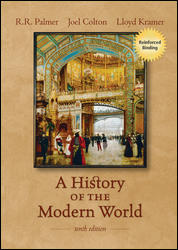 
History of the Modern World, 10th Edition (Palmer)Chapter 7:
The Struggle for Wealth and EmpireLearning ObjectivesChapter 7 teaches students about:
The rise of modern science and a scientific view of the world and human affairs. |
 |  |  |
The precedents for the scientific breakthroughs of the seventeenth century. |
 |  |  |
Bacon and Descartes, and how they heralded both a scientific view of the world and a scientific method for establishing and testing knowledge. |
 |  |  |
Advances made in the sciences in the seventeenth century. |
 |  |  |
The tremendous gains in astronomy and physics, which reshaped conceptions of God and the world and promised concrete breakthroughs with economic benefits. |
 |  |  |
How European expansion encouraged reciprocal influences and the questioning of previous thinking on religion, language, and human origins. |
 |  |  |
The current of skepticism, and its impact on the historical sciences, law, and religious scholarship. |
 |  |  |
The philosophy of natural law and natural right, which facilitated the promotion of ideas of universalism and progress. |
 |  |  |
The ideas of Hobbes, the leading proponent of secular absolutism and one of the great theorists of state sovereignty. |
 |  |  |
The ideas of Locke, whose justification of constitutionalism was especially influential in the British colonies. |
 |  |
|





